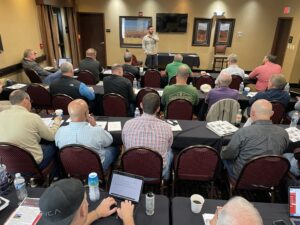
FORT WORTH, Texas (BP)–Irony abounded as many of the Hollywood pacifist crowd were lauding one another in their annual back-patting bonanza while officials with the U.S. Central Command in Qatar were briefing reporters on the advance toward Baghdad.
If you chose to watch the lowest-rated Oscar broadcast in history, you didn’t have to wait long for anti-war rhetoric to spew from the stage.
Mind you, we’re all so very thankful that Hollywood mustered the courage to hold the Oscars. Undeterred by potential threats of terrorism — and motivated to avoid this year’s “worst dressed” list — they smiled their million-dollar smiles, adorned with a veritable cornucopia of glistening jewelry.
While the surgically altered were giving standing ovations to the icons of western culture that once again pushed the boundaries of irrelevance, true fortitude and determination were being displayed 7,500 miles away in places named Basra, Naseriyah and An Najah. Young men and women were taking hostile fire, patching wounds and attempting, by all accounts successfully, to free the oppressed people of Iraq.
Look up the words “valor” and “courage” in the dictionary and you will find that both words, Latin in origin, characterize the young men and women fighting in Iraq. Valor comes from the verb “to be strong.” Courage is derived from the word for “heart.” “To be strong of heart,” you might say.
Protesting war is a constitutionally guaranteed exercise. I would never deny that, and I am willing at least to listen as long as legitimate reasons are given for stopping a war. Hyperbole or gross exaggeration of the facts, however, I cannot tolerate. Nor can I accept the words of Christ misappropriated to fit a position on war that becomes nationally self-centered and personally self-serving.
An example? You don’t have to look far to find one in Martin Sheen, who has become Hollywood’s most outspoken anti-war critic. A gifted actor, Sheen has been defined by liberal Catholicism or social activism without much emphasis on the true saving power of Jesus Christ. During a peace rally in San Francisco recently, Sheen, fulfilling the role of a Tinseltown messiah, greeted the crowd, “Peace be with you.”
“From this time forth, may all our thoughts, words and deeds be nonviolent resistance to all violence. Let my country awake,” Sheen went on to say with all of the vigor of a country preacher. Does he really think it’s his country? Oh yeah, he must be the president because he plays one on television.
The peace movement in Hollywood has its apostles. Mike Farrell, Matt Damon, Jessica Lange and Janeane Garafalo, among others, have spread their anti-war gospel throughout the nation, seldom with any rhetoric infused with realism or knowledge of military-foreign policy.
If only the United States had allowed more inspections, they say, Saddam Hussein might have been disarmed peacefully and with the approval of the United Nations. Naivety seems to be a spiritual gift in Hollywood these days.
Worse, they have all have said that God never approves of war — that we must always be nonviolent. In an interview with FOX News, Sheen claimed that Americans should see “the nonviolent face of Jesus on every Iraqi child,” as if Jesus would never, under any circumstances, advocate using force to defend the oppressed.
Really? Do Hollywood’s exhortations for peace reveal what the Bible says about war and peace?
When I speak to anyone about war I encourage them to consider a few things before forming too strong of an opinion that war is never, ever within the possible courses of action we should take.
First, by saying that Jesus would never, ever advocate the defense of the defenseless, anti-war opponents are hinting, perhaps openly saying, that God never approves of the decision of young men to defend their country, or the oppressed. All such men, even Christians they believe, stand opposite the teachings of Jesus by doing so. It simply isn’t that simple. Many who have gone to war, Mr. Sheen, have gone precisely because they see the “face of Jesus on every Iraqi child.”
Second, there is no consistent position on war in the Bible, and that complicates the situation. The late T.B. Maston, a Baptist ethicist, said, “What one finds on war in the Bible depends largely on what one wants to find.” In other words, people find texts to support their own opinions, and Scripture contains very little insight in how modern nations should behave in relation to one another.
For example, pacifists say that Jesus instructed his disciples to “turn the other cheek.” In this case, Jesus was speaking of the impropriety of personal retaliation, not foreign policy. The apostle Paul wrote more often of the government and even developed a theology of political power in his letter to the Romans. He wrote that Christians should be subject to their government, but he did not mean we should always support the government if it chooses to wage an unjust war and enacts unjust policies. It is permissible to protest such decisions.
In other words, Scripture makes room for the individual Christian to decide which is the appropriate action for his or her life in relation to war. The Southern Baptist Convention of 1940 recognized so by issuing a resolution recognizing the right of conscientious objection to war.
The Baptist Faith and Message contains an article on war and peace that states that the Christian’s duty is to seek peace with all men. Some Baptists have interpreted the article as an endorsement of pacifism. Most have not because, as James Parker, a professor at Southern Baptist Theological Seminary, wrote, “where unrighteousness, injustice and wickedness dwell, there can be no peace.”
Such ideas about war lead me to this certainty: The body of Christ will never come to comfortable, unified position on war.
War is not forbidden in the Bible, is sometimes necessary (contra Sheen, et al.) and is only looked upon unfavorably when carried out unjustly (without God’s direction). But war is clearly not God’s ideal. He wishes that no one should die in war, especially innocents. War especially is never intended to advance the Christian faith.
One of my favorite historical personas is Theodore Roosevelt. A war veteran, president and Christian, Roosevelt was awarded the Nobel Peace Prize for arbitrating a dispute between Japan and Russia. In his acceptance speech, he said, “Peace is generally good in itself, but it is never the highest good unless it comes as the handmaid of righteousness. And it becomes a very evil thing if it serves only to further the ends of despotism and anarchy.”
E.Y. Mullins, one of Southern Baptist’s earliest theologians, wrote in the midst of World War I, “The gospel is clearly opposed to the warlike spirit when that spirit is based on any form of unrighteousness. It would be going too far to say the Christianity is inconsistent or incompatible with every form of war. There are forms of war and oppression that only war can destroy. But the desire for national greatness, based on the injury of other nations, is wholly alien to the spirit of Christianity. Christ died for the human race. And while national feeling and patriotic loyalty are not opposed to the gospel, yet every other form of such feeling which forgets the rights of others is opposed to it. A narrow nationalism which forgets other nations is an antichristian ideal.”
Wise men, Roosevelt and Mullins. I’ll take their opinions over Hollywood’s.
I regret that war is now a reality. I fell on my face before God when it began. I am not ashamed to admit that I wept for those who would perish. But I thought of future generations of Iraqis living in freedom, without fear and with a chance to choose Christ for themselves. It was natural then to support what is so unnatural for the Christian — war.
–30–
Tomlin is news director at Southwestern Baptist Theological Seminary in Fort Worth, Texas.















